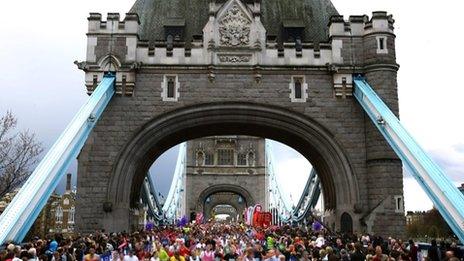Robbie Simpson: Mountain man aiming to upset the London Marathon odds
- Published
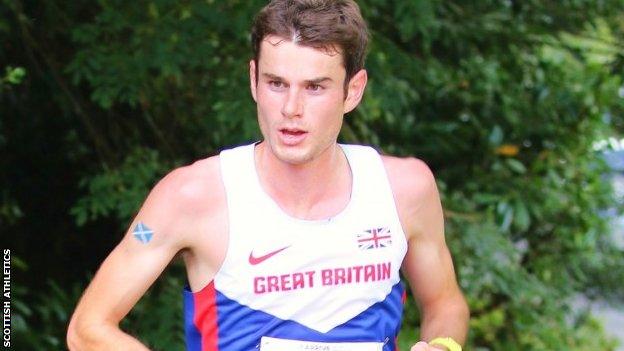
Simpson has his sights on a place in Scotland's Commonwealth Games team
As he talks about his frugal life of cheap oats and relative solitude in a small town in the Bavarian mountains, Robbie Simpson sounds more like a wannabe Bear Grylls than a marathon runner from Banchory.
On Sunday, Simpson will be in the field in London along with 40,000 others.
Last year he finished ahead of all bar 17 of them, which wasn't a bad effort for a man who runs up hills for a living instead of running on roads and who, to add to the task, spent much of the week leading up to London in his bed only half-alive following food poisoning.
Simpson's tale is an unconventional one. This weekend is about London, but there's a bigger picture. He sees the world athletics championships in the summer, he sees the Commonwealth Games next year.
What he also sees, of course, are many elite Scottish and English marathon runners ahead of him. He's the underdog, but he's comfortable with that.
"I'm based in south Germany most of the time, just on the border with Austria," he says. "It's a town called Mittenwald between Innsbruck and Munich. Mittenwald means middle of the forest and that about sums it up.
'I train better when it's hard'
"I had a choice of living with friends in a city somewhere and doing a job I didn't like or moving somewhere like this and doing everything I ever wanted to do. Yeah, there's not many people around. There's not many comforts, but this is perfect for me.
"I train better when it's hard. I get on with it better when it's just me and the pain of the training. The Kenyans do the same, even the most famous and the richest ones. They don't live with their families when they're training, they move into the mountains and live in huts with no electricity and just sleep on horrible hard mattresses on the floor.
"They do it for weeks. Eat simple food and train. They say you can't train hard when you're comfortable.
"These guys, by Kenyan standards, are really wealthy. They own loads of property but they say if you surround yourself with comfort you lose the hunger. It's difficult to get up at 5am to run 20 mile runs when you're in luxury."
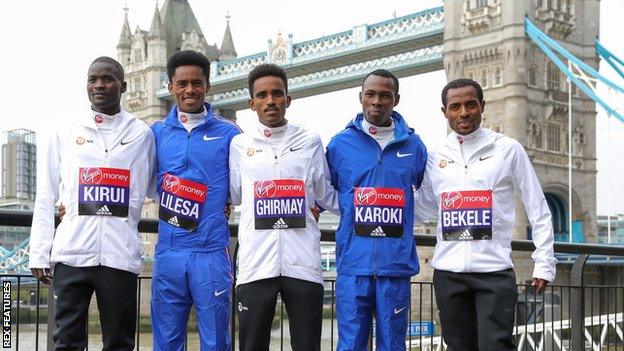
Ethiopian legend Kenenisa Bekele (right) leads a top class field in London
Now 25, this life was set in train when he was a kid trying to find a sport that suited him. He tried javelin and the magic didn't happen. Shot put - same story. Track running - boring.
Around the age of 12 he ran up a hill in Banchory and something clicked.
Through his teens he raced in Aberdeen and Inverness, Balmoral and Bennachie, Torlundy and Tillicoultry. Then it got serious and the meetings got more exotic - La Montee du Grand Ballon in France, Zurcher Silversterlauf in Switzerland, Grunder Stadtlauf in Germany.
Help from home
"There's a man called Bert McIntosh who owns a plant hire company at home," Simpson explains. "He's in his 70s now and loves his triathlons. An amazing person.
"He sponsors local schools, local events and local athletes. He's been very generous to me and I've needed his help because there's not a lot of money to be made in what I do. If you win a small race you get a few hundred euros, a middle-ranking race might get you a thousand or 1,200, a bigger race about 1,800 euros.
"When I finished university and went hill running full-time I'd saved up enough cash to get me through a summer, but beyond that Bert backed me and helped me pay the rent and survive.
"You learn very quickly how to live cheaply. I can get by on 10,000 euros a year on food, rent, travel - and there's a fair bit of travel. You add in whatever prize money you get and that's how I do it."
In his world there are a couple of races in the year that offer a relative jackpot - the illustrious Jungfrau Marathon in Switzerland is one of them. Last September, Simpson won it - prestige and pounds, about seven thousand of them.
"Mountain racing is so unpredictable," he says. "On the road, whoever has the best times previously normally wins, but in the mountain races there are so many uncertainties - the weather, the terrain, the steepness of the climb. Every mountain is different.
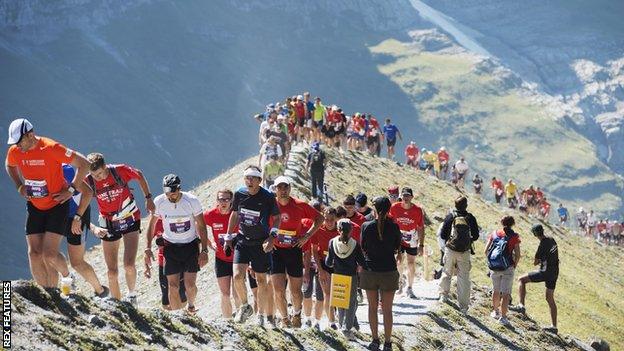
The Jungfrau Marathon has a few steeper climbs than London
"When I first started it was just about racing in Scotland and Ben Nevis was a memorable one. Then I ran Mount Snowdon in Wales and it was my first breakthrough race. I was 18 - the youngest in it. I thought I was just competing for the experience and I ended up winning.
"It was misty and wet and windy and stormy - brilliant. I didn't even know I'd won. I presumed there was a guy ahead of me but I couldn't see him because of the mist, but there was nobody there.
"Then I started racing a lot in Norway and Switzerland and it's all bouldery and snowy. Jungfrau was my biggest day ever. I did it for the first time in 2012 and I made the top-10 and was thinking that this was a race you dream about winning. About 4,000 people enter. It's a full marathon but the first half is mostly flat and the second half you start climbing uphill and you finish just below the Eiger.
"That was a huge day. I didn't exactly make London Marathon type money but what I got was nearly enough to keep me going for a year."
Working on leg speed
London is a major goal but it's also a means to an end. He has a massive, almost insurmountable, job on his hands to break into the British team for the Worlds in the summer and his task in trying to run fast enough to make the Scotland team for Gold Coast 2018 is also a mammoth one.
Callum Hawkins is a certainty for that team. His brother, Derek, and the Scottish-Eritrean, Tsegai Tewelde, are the hot favourites to take the other spots. Not that Simpson is lying down.
"I ran 2.15.38 in London last year but to put myself in the frame for the Commonwealth Games I need to go under 2.15.30," he says.
"Scotland has plenty of good marathon runners at the moment. A lot of the other guys come from track and road backgrounds and they've been doing it for years, but for me it's harder. Coming from mountain running, I don't have that same speed in my legs.
"I can go up steep hills but I can't run forever on a flat road at a fast pace. That's what I've spent the last few months working really hard to improve. It's a big challenge."
One thing is obvious about Simpson - big challenges are what he basks in.
- Published19 April 2017
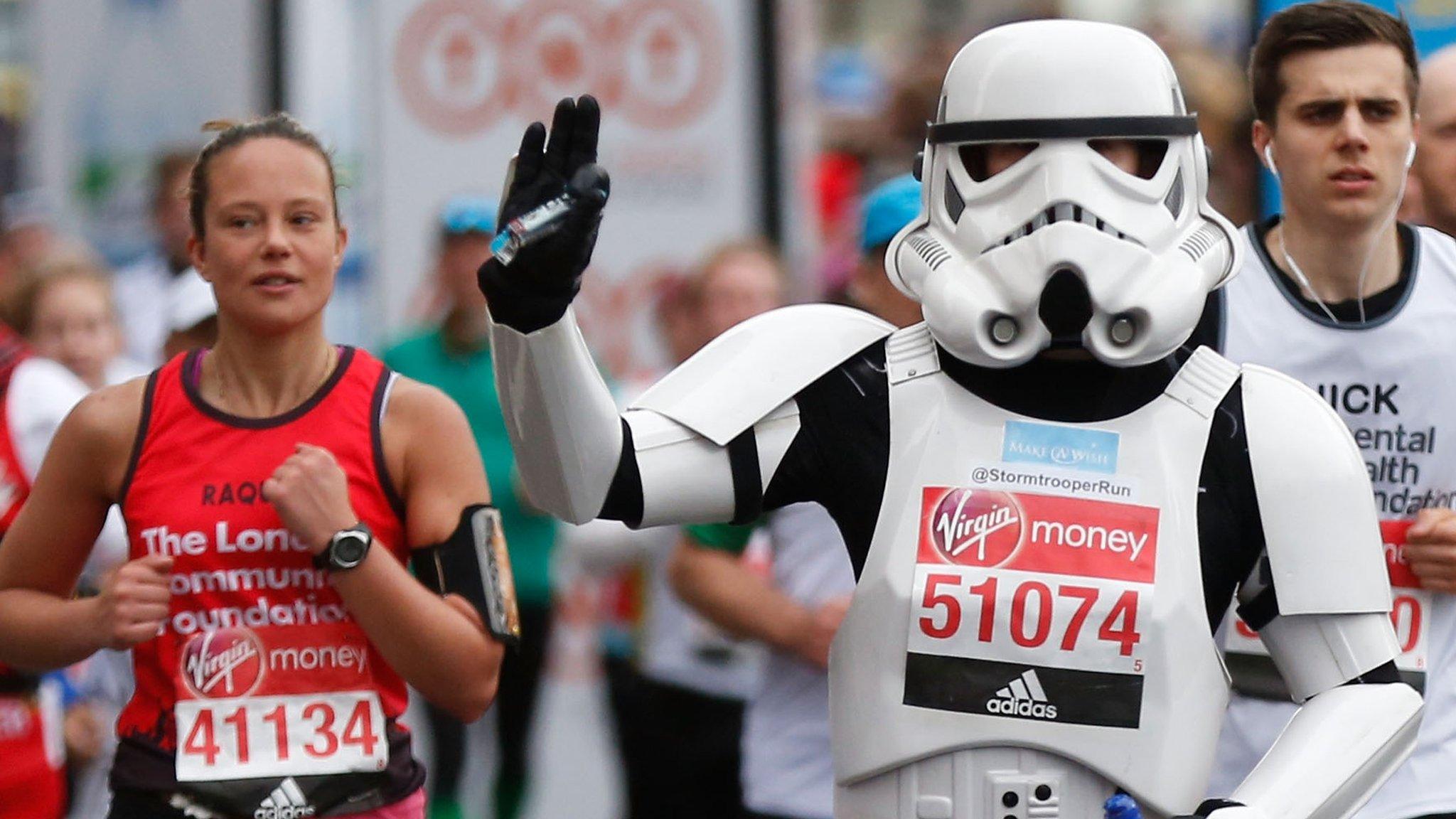
- Attribution
- Published21 April 2017
